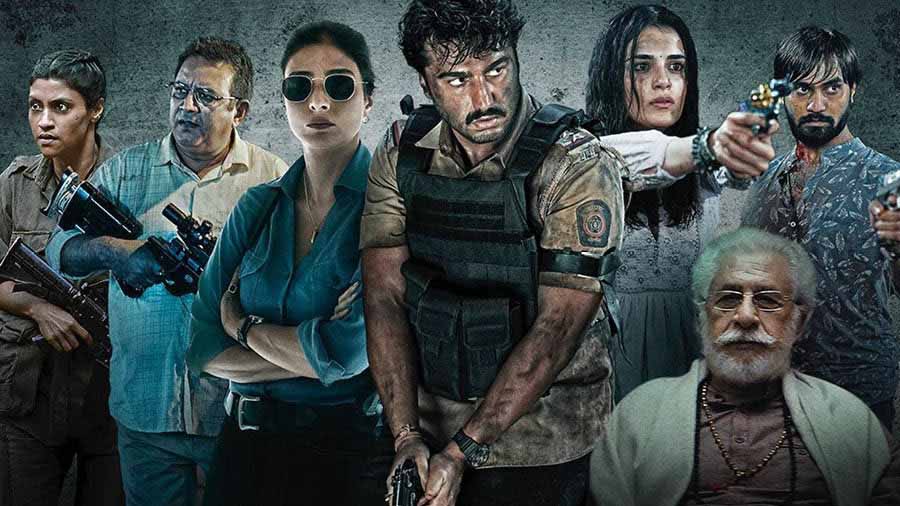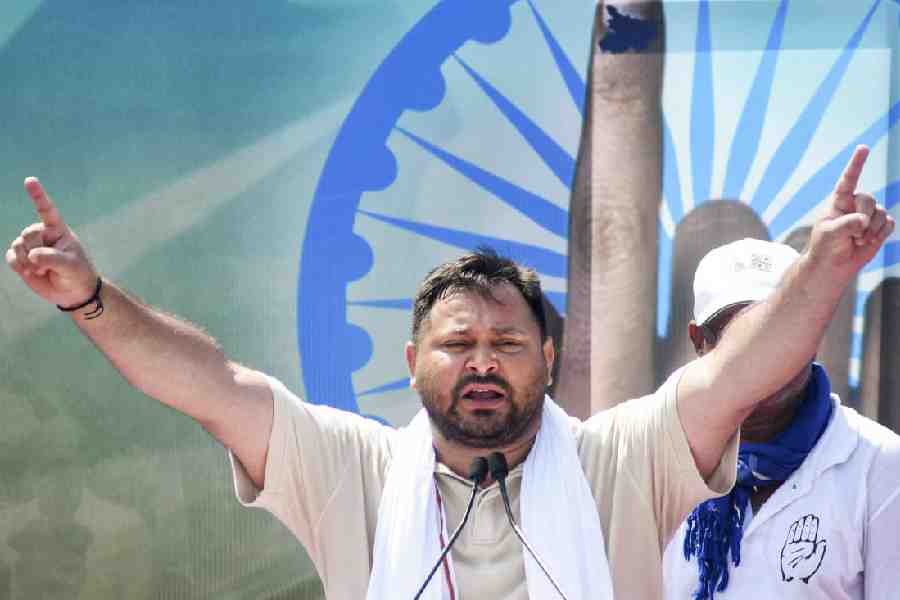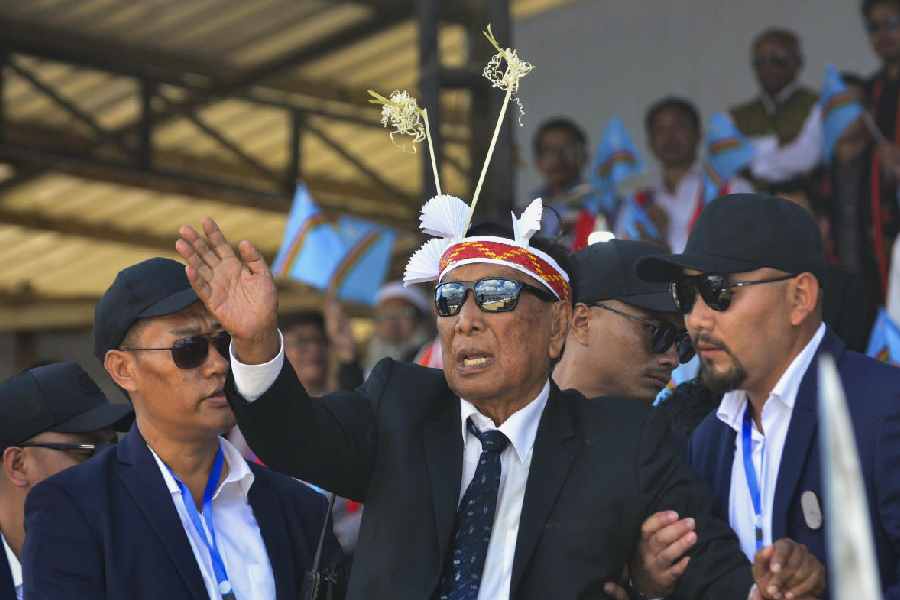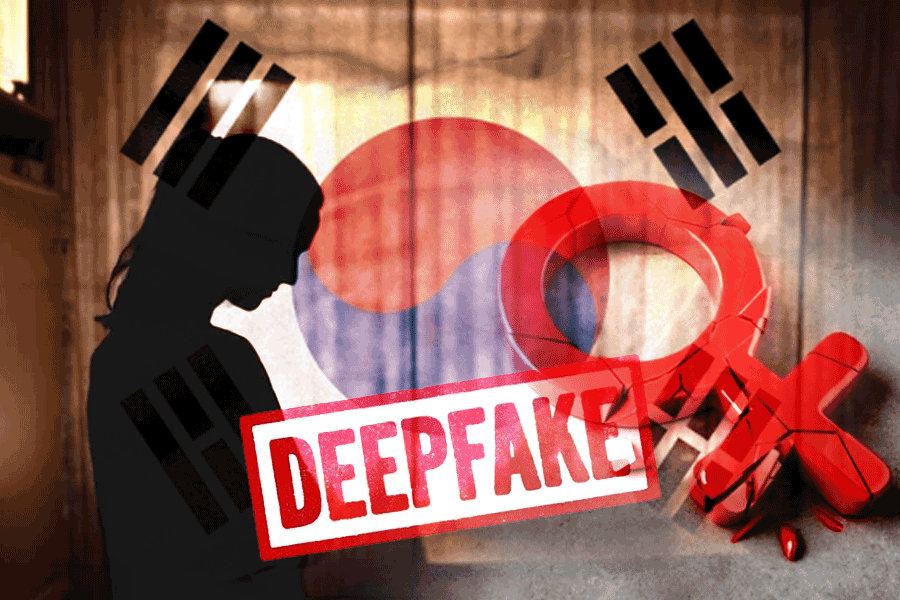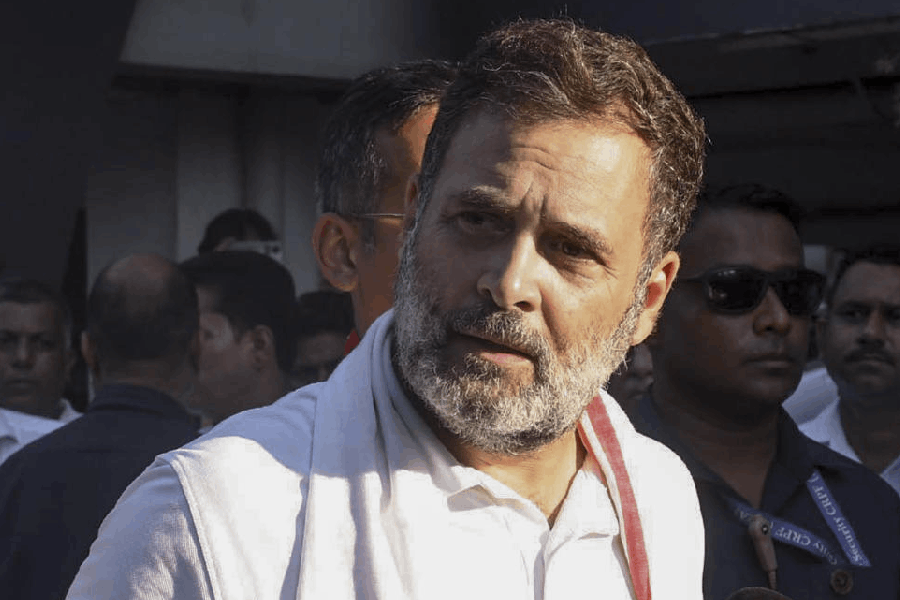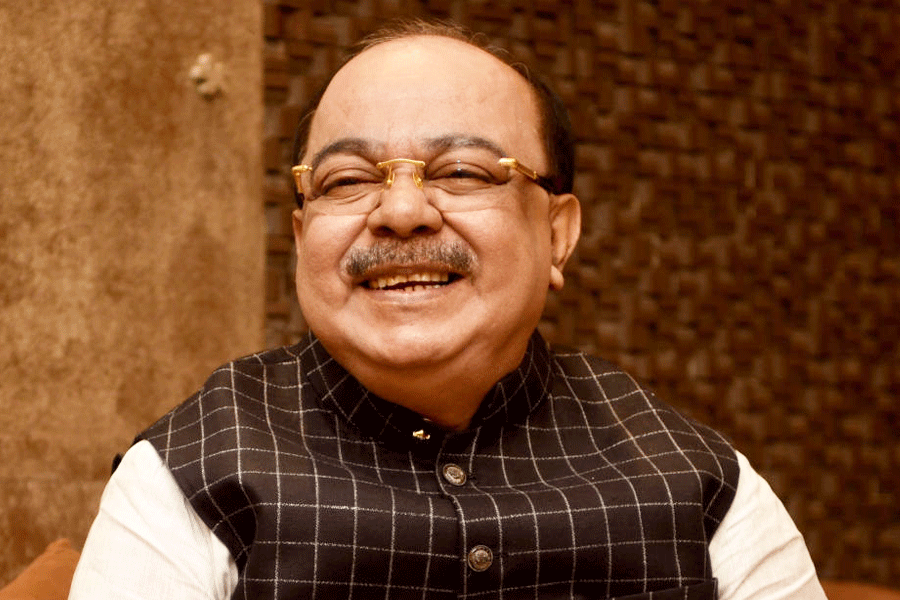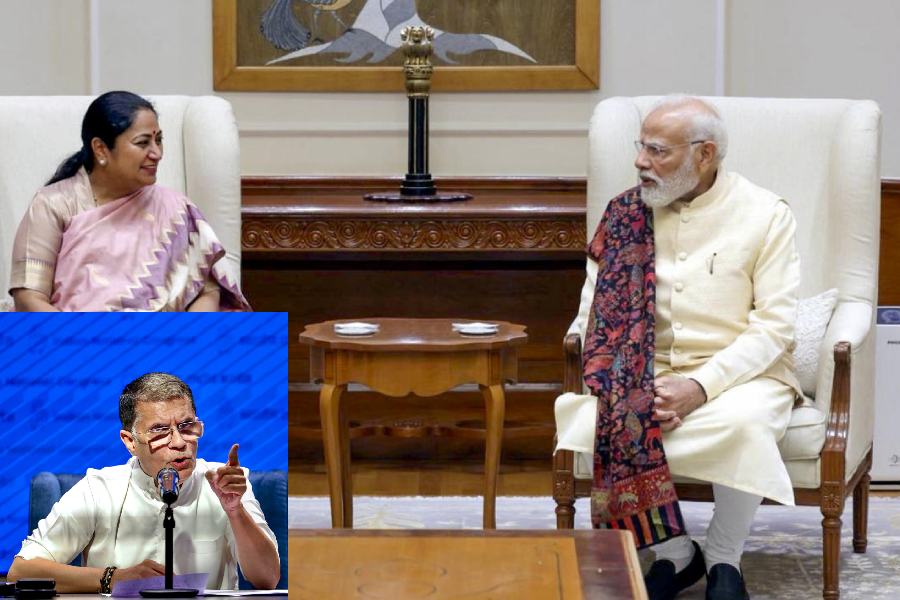Following in the footsteps of one’s father has just got a new meaning. As far as continuing a legacy is concerned, Aasmaan Bhardwaj has written his name into the annals of Hindi cinema history with his first film. There’s a delectable ring to his debut feature, Kuttey, seen in the light of his father Vishal Bhardwaj’s 2009 film Kaminey. Between father and son, they have encapsulated the ambience of Hindi film dialogues of an entire era. As Kuttey gears up for release on January 13, the young filmmaker speaks about the making of the film, the influences that have shaped him, and what it means to be the son of Vishal and Rekha Bhardwaj.
What was it about Kuttey that made you decide on this as your debut feature?
Aasmaan Bhardwaj: I wrote it in college for my degree. It is one of the most complex screenplays that I wrote as part of my project. In the screenwriting course, we had to either write a screenplay for a feature or a bible for a show. I chose to write feature film screenplays. Kuttey was the last one I wrote. I had finished writing my scripts much before my semester ended. Since I was done with my thesis project, I asked my teacher if I could experiment and work on a crazy structure of a screenplay. For the three years preceding that, I had done it according to the screenplay act structure that I was taught. I wanted to do something out of the box and my teacher gave me the permission to do so. That is how Kuttey started.
That’s the primary reason why I chose this as my first film. The screenplay is one of my favourites. The story is rather simple – three groups on the trail of a vanload of money. It is unique in the way I have narrated it – the visual treatment, the background, the tone of the actors. Since I am a writer first, I hope that people like the screenplay. The complexity of the screenplay should show in the film. I am proud of my screenplay and the way it is structured.
The legacy thing has happened as a byproduct. It wasn’t a conscious decision. Both Kaminey and Kuttey are essentially capers. At this point my goal is to make good films and tell good stories and tell them in my way, in my voice. That is what I’ve learnt from my dad. He has drilled it into me that appreciation, success will come and go but what will be remembered is the film. That’s the only legacy I want to work on.
Tell us something about yourself and your journey to the first film. I hope Vishal and Rekha did not force you!
Aasmaan Bhardwaj: (Laughs) My parents never forced me. They have always given me the freedom I wanted. Luckily for me, I was clear from a young age that I wanted to be a filmmaker. I had gone on set during the shooting of Makdee and Maqbool and I loved it. When I was a child, I loved hearing stories. I was blessed with a strong imagination and could visualise what I was hearing. It was on the sets of Makdee that I decided I wanted to be a filmmaker. I used to roam around with the production designer of Makdee. He had made a thermocol camera for me. He glued together three sticks, which was my tripod. I took that and stood next to the real camera and used it as if I could see something through it. I would pretend that I was also shooting something. That is when I started thinking this is what I wanted to do.
My parents gifted me a DV camera during the shoot of Maqbool and that is when I started recording things. I used to approach the crew and take different shots. For example, someone might be running up a staircase and I would make it look like a chase sequence. During summer recess, I made short films with my friends. I remember, once, using the cap of a Coca-Cola bottle, which is red in colour, to indicate blood in a particular shot. It was good timepass for me and a great learning.
What are the other hobbies that you pursue and how have they helped in your journey as a filmmaker?
Aasmaan Bhardwaj: Music is a huge hobby. A passionate one. We had regular music classes in school till around Class X and I learnt to play a number of instruments – violin, guitar, flute, saxophone, piano, drums. Football is another hobby. I’m also a big gamer. I love Call of Duty – the game helped me so much with Kuttey because it has extensive gun action. There are many shootouts in the film. Another game I dig is Tom Clancy’s Rainbow Six Siege. Playing these games gave me insights into the tactical aspects of a shootout. So when I was shooting, I was clear about crafting my action sequences. I wanted the action to be like a Jason Bourne film where it is so real, unlike in Indian cinema. Another thing I love is cooking – I find it therapeutic.
Tell us about your film school and experiences in apprenticing with Vishal on his films.
Aasmaan Bhardwaj: I don’t know how to put my experience of film school into words. I was living and breathing cinema. My whole life was just about films because of film school. Imagine watching films even as homework! What more can you ask for? Film school is an experience no aspiring filmmaker should miss out on if you have the opportunity. My course was designed and created in a way to equip me with the tools needed to make a film.
Assisting Dad on his films gave me practical on-ground experience. I got to observe one of the best directors at work. His cinema is a class apart. To be able to watch and understand how he thinks, his craft, his method helped a lot. It is not something a film school could offer. Between these two – the film school and my Dad’s sets – I got the best of both worlds.
What are the films and filmmakers you have been influenced by?
Aasmaan Bhardwaj: There are many. Foremost among them, Dad. I have admired directors like Anurag Kashyap, Sriram Raghavan and films like Bandit Queen and Article 15. As a child, I used to enjoy action films immensely. I am a big Shah Rukh Khan fan. I love Don and Main Hoon Na. I also loved Chaitanya Tamhane’s Court and Disciple, though I wouldn’t say they influenced me.
I am more influenced by international cinema. Dad made it a point to have me watch these. I saw Seven by David Fincher, and was blown away. I love his films. I also love Martin Scorsese’s films. He is a league apart, not just as a filmmaker but also as a technician. He does so many things which are unique. Stanley Kubrick is one of my top influences. Eyes Wide Shut is my favourite film. I want to explore a man-woman relationship like he does in it. I love Wong Kar-Wai’s films. Among my favourite films are 400 Blows, Bicycle Thieves, and Murmur of the Heart, a French film. Murmur… changed my understanding of human emotions and helped me in terms of understanding my characters and making them as human as possible.
The list is endless. Oldboy (by Park Chan-ook) is another favourite – one of the few films where, at first, I was not able to grasp the third act. Given my schooling in cinema, the writing exercises I have done in film school, in the normal course, by the end of the second act or the middle point of the film, I get a sense of what is likely to happen in the third act. Oldboy threw me off. The visual treatment is also great.
Vishal once mentioned that he had to pick up the ropes directly on the sets – neither a film school nor working as an assistant. How do you think a film school education helps? What is it that a film school gives that you otherwise would lack? Or is it a hindrance?
Aasmaan Bhardwaj: Film school actually offered in a capsule what Dad has learnt in over 22 years of being a filmmaker. Film school will give you a base for what you need. So when you get to the set, you know the theory, and can start mastering it practically. Dad would have become a master of his craft much earlier had he gone to film school. A film school gives you a structured way of learning what filmmaking actually is. But it is expensive.
With Vishal and Rekha as parents, there will be the usual debate on whether Kuttey is a debut on a platter.
Aasmaan Bhardwaj: I don’t think it is a debate about a debut on a platter. Their stature in the industry facilitated the process – it is probably the access that came on a platter. But not my debut as a filmmaker because as a filmmaker, I’ve not got any advantage of being their son. I got the benefit of being their child, for example, in meeting Luv Ranjan for a narration and getting him on board. Being able to reach Arjun Kapoor for a narration, sending my script to Tabu ma’am. That is where the benefits stopped.
Nobody is going to fund my film only because my parents are who they are. If they don’t believe in your script, they will reject it. It is as simple as that – and as brutal. If my script wasn’t good, all the actors would have rejected it too. They are not doing me a favour just because I am my parents’ son. At the end of the day, I have my own responsibility to make and write good films. The reason my parents are big achievers is that they are true and honest to their craft. That is what I want to do as well. That’s the only pressure I have.
What was it like to direct legends like Naseeruddin Shah, Tabu, Konkona Sensharma and the others?
Aasmaan Bhardwaj: It has been a dream come true. To work with such big people in my first film was an honour and privilege. It’s still unbelievable. Watching the film during the edits was almost unreal. It was surreal to watch such people say the lines that I have written, do the things that I’ve imagined in my head. There were butterflies in my stomach on the first day with Naseer Bhai, Tabu ma’am and Konkona ma’am. I was scared. Despite all my preparations, I was so nervous about how I would call ‘cut’ when someone so big was performing. How do I tell them to stop?
I remember the first take of Tabu ma’am. The actors kept going after a point because I just kept watching them perform, as if I was watching a scene, a film in the theatre. They kept improvising. After a point they turned towards the monitor to see why I was not calling ‘cut’. Then the script supervisor, Shoma Roy, nudged me to cut the scene. I was in such awe of these people that I wasn’t able to call ‘cut’ the first time I said ‘action’ to them. After that it was easier.
The best thing about all these actors is that they treated me as a director. They asked me how I imagined the sequence, their characters. They insisted that I tell them what I wanted. That empowered me. When I was nervous, I asked Dad, ‘How do I direct them?’ He said, ‘They are the actors and you are the director. You have to be professional about that. Yes, they are legends. But they are your characters before that.’
Do you remember your first day at shoot?
Aasmaan Bhardwaj: The first day is forever etched in my mind. We were shooting in Vasai-Virar. It was very emotional to be calling ‘action’ and ‘cut’ for the first time. Finally, the moment I had imagined all these years had arrived.
Let’s talk about the song Awaara Dogs. What was your brief to Gulzarji for the song? What’s your involvement with the film’s music given that Vishal himself is a composer?
Aasmaan Bhardwaj: I don’t remember exactly but I had a discussion with him. I told him that there was no lip-sync situation I could give him. I had visualised it as a background piece. My brief for Awaara Dogs was: ‘The film is about greed and selfishness. The characters are after the van and the money and they are ready to kill anyone for it. They all are grey characters.’ Because he had read the script, he knew what I was talking about. I had written four-five lines and sent it to him. He understood, though I was not able to decide what exactly I wanted. He is so perceptive that he gave me the feel of what I was looking for in the song. He understood the film.
I was very involved with the music and background score of Kuttey. Music is important to me and it is in my blood. Even while writing the script, I had music pieces on my head. It is written in the script. I imagined the script with music. I cannot imagine or write a film without the music. I am into a lot of electronic music, I love the new urban sound, I love original soundtracks. I wanted Kuttey to be electronic but at the same time have an Indian feel, using classical instruments like the tabla and dhol and creating some electronic fusion. Music is an important part of Kuttey. It is not just the songs, it is the background music too.
What’s next in the pipeline?
Aasmaan Bhardwaj: Kuttey has been so consuming that I’ve not been able to think about what’s next. I do have a lot of scripts I had written in college. I want to redraft them. Until Kuttey gets to the theatres, I am not thinking of anything else. I want to do something different. For now, I am just letting this film sink in.
(Shantanu Ray Chaudhuri is a film and music buff, editor, publisher, film critic and writer. The article was written with Soujannya Das)

